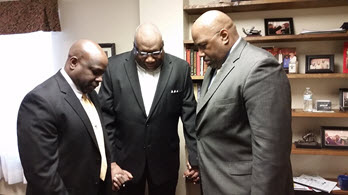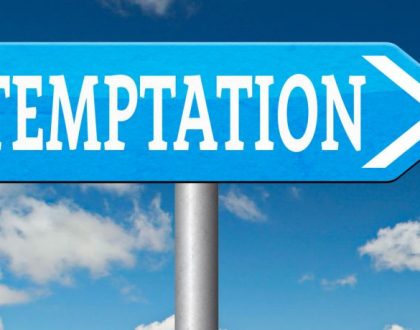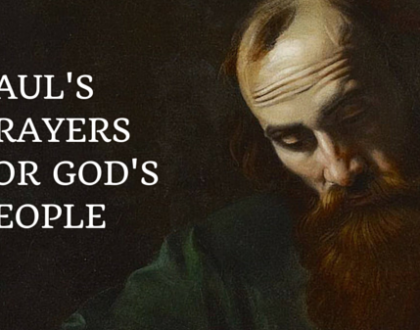Dr. John Oswald Sanders on the Leader and His Prayer Life

by Ed Arcton
I urge then, first of all, that requests, prayers, intercession and thanksgiving be made for everyone. 1 Timothy 2:1
Prayer and Leadership
The spiritual leader should outpace the rest of the church, above all, in prayer. And yet the most advanced leader is conscious of the possibility of endless development in his prayer life. Nor does he ever feel that he has “already attained.” Dean C. J. Vaughan once said: “If I wished to humble anyone, I should question him about his prayers. I know nothing to compare with this topic for its sorrowful self-confessions.”
Prayer is the most ancient, most universal, and most intensive expression of the religious instinct. It includes the simplest speech of infant lips, and the sublime entreaties of older age. All reach the Majesty on high. Prayer is indeed the Christian’s vital breath and native air.
But, strange paradox, most of us find it hard to pray. We do not naturally delight in drawing near to God. We sometimes pay lip service to the delight and power of prayer. We call it indispensable; we know the Scriptures call for it. Yet we often fail to pray.
Let us take encouragement from the lives of saintly leaders who overcame this natural reluctance and became mighty in prayer. Of Samuel Chadwick it was said: He was essentially a man of prayer. Every morning he would be astir shortly after six o’clock, and he kept a little room which was his private sanctum for his quiet hour before breakfast. He was mighty in public prayer because he was constant in private devotion. . . . When he prayed he expected God to do something. “I wish I had prayed more,” he wrote toward the end of his life, “even if I had worked less; and from the bottom of my heart I wish I had prayed better” (N.G. Dunning, Samuel Chadwick. London: Hodder & Stoughton, 1934, 19).
“When I go to prayer,” confessed an eminent Christian, “I find my heart so loath to go to God, and when it is with Him, so loath to stay.” Then he pointed to the need for self-discipline. “When you feel most indisposed to pray, yield not to it,” he counseled, “but strive and endeavor to pray, even when you think you cannot.”
Mastering the art of prayer, like anything else, takes time. The time we give it will be a true measure of its importance to us. We always find the time for important things. The most common excuse for little time spent in prayer is the list of “to-dos” that crowd our day—all our many duties. To Martin Luther, an extra load of duties was reason enough to pray more, not less. Hear his plans for the next day’s work: “Work, work from early till late. In fact I have so much to do that I shall spend the first three hours in prayer.” If Luther was busy, and prayed, so can we.
Try to explain exactly how prayer works and you will quickly run against some very difficult puzzles. But people who are skeptical of prayer’s validity and power are usually those who do not practice it seriously or fail to obey when God reveals His will. We cannot learn about prayer except by praying. No philosophy has ever taught a soul to pray. The intellectual problems associated with prayer are met in the joy of answered prayer and closer fellowship with God.
The Christian leader who seeks an example to follow does well to turn to the life of Jesus Himself. Our belief in the necessity of prayer comes from observing His life. Surely if anyone could have sustained life without prayer, it would be the very Son of God Himself. If prayer is silly or unnecessary, Jesus would not have wasted His time at it. But wait! Prayer was the dominant feature of His life and a recurring part of His teaching. Prayer kept His moral vision sharp and clear. Prayer gave Him courage to endure the perfect but painful will of His Father. Prayer paved the way for transfiguration. To Jesus, prayer was not a hasty add-on, but a joyous necessity.
In Luke 5:16 we have a general statement which throws a vivid light on the daily practice of the Lord. “And He withdrew Himself in the deserts and prayed.” It is not of one occasion but of many that the evangelist speaks in this place. It was our Lord’s habit to seek retirement for prayer. When He withdrew Himself from men, He was accustomed to press far into the uninhabited country—He was in the deserts. The surprise of the onlookers lay in this, that one so mighty, so richly endowed with spiritual power, should find it necessary for Himself to repair to the source of strength, that there He might refresh His weary spirit. To us, the wonder is still greater, that He, the prince of Life, the Eternal word, the Only-begotten of the Father, should prostrate Himself in meekness before the throne of God, making entreaty for grace to help in time of need (D.M. McIntyre, The Prayer Life of Our Lord. London: Morgan & Scott, n.d., 30–31).
Christ spent full nights in prayer (Luke 6:12). He often rose before dawn to have unbroken communion with His Father (Mark 1:35). The great crises of His life and ministry began with periods of special prayer, as in Luke 5:16: “Jesus often withdrew to lonely places and prayed”—a statement that indicates a regular habit. By word and example He instructed His disciples on the importance of solitude in prayer (Mark 6:46, following the feeding of the five thousand; Luke 9:28, preceding the Transfiguration). To the person on whom devolves the responsibility for selecting personnel for specific spiritual responsibilities, the example of the Lord’s spending the night in prayer before making His choice of apostles (Luke 6:12) is luminous.
Both our Lord and His bond slave Paul made clear that true prayer is not dreamy reverie. “All vital praying makes a drain on a man’s vitality. True intercession is a sacrifice, a bleeding sacrifice,” wrote J. H. Jowett. Jesus performed miracles without a sign of outward strain, but “he offered up prayers and petitions with loud cries and tears” (Hebrews 5:7).
Sometimes our prayers are pale and weak compared to those of Paul or Epaphras. “Epaphras . . . is always wrestling in prayer for you,” wrote Paul in Colossians 4:12. And to the same group: “I want you to know how much I am struggling for you” (Colossians 2:1). The Greek word used for “struggle” here is the root for our words “agony” and “agonize.” It is used to describe a person struggling at work until utterly weary (Colossians 1:29) or competing in the arena for an athletic prize (1 Corinthians 9:25). It describes a soldier battling for his life (1 Timothy 6:12), or a man struggling to deliver his friends from danger (John 18:36). True prayer is a strenuous spiritual exercise that demands the utmost mental discipline and concentration.
We are encouraged to note that Paul, probably the greatest human champion of prayer, confessed, “We do not know what we ought to pray for.” And then he hastened to add, “The Spirit intercedes for us with groans that words cannot express. And he who searches our hearts knows the mind of the Spirit, because the Spirit intercedes for the saints in accordance with God’s will” (Romans 8:26–28). The Spirit joins us in prayer and pours His supplications into our own.
Pray in the Spirit
All Christians need more teaching in the art of prayer, and the Holy Spirit is the master teacher. The Spirit’s help in prayer is mentioned in the Bible more frequently than any other help He gives us. All true praying comes from the Spirit’s activity in our souls. Both Paul and Jude teach that effective prayer is “praying in the Spirit.” That phrase means that we pray along the same lines, about the same things, in the same name, as the Holy Spirit. True prayer rises in the spirit of the Christian from the Spirit who indwells us.
To pray in the Spirit is important for two reasons. First, we are to pray in the realm of the Spirit, for the Holy Spirit is the sphere and atmosphere of the Christian’s life. In this we often fail. Much praying is physical rather than spiritual, in the realm of the mind alone, the product of our own thinking and not of the Spirit’s teaching. But real prayer is deeper. It uses the body, requires the cooperation of the mind, and moves in the supernatural realm of the Spirit. Such praying transacts its business in the heavenly realm.
Second, we are to pray in the power and energy of the Spirit. “Give yourselves wholly to prayer and entreaty; pray on every occasion in the power of the Spirit” (Ephesians 6:18 NEB). For its superhuman task, prayer demands more than human power. We have the Spirit of power as well as the Spirit of prayer. All the human energy of heart, mind, and will can achieve great human results, but praying in the Holy Spirit releases supernatural resources. The Spirit delights to help us pray. In each of our three chief handicaps, we can count on the Spirit’s help. Sometimes we are kept from prayer by sin in our heart. As we grow in trust and submission, the Holy Spirit leads us to the blood of Christ, which cleanses every stain.
Sometimes the ignorance of our minds hinders our prayers. But the Spirit knows the mind of God and shares that knowledge with us as we wait and listen. The Spirit does this by giving us a clear conviction that a particular prayer request is part of God’s will for us, or not.
Sometimes we are earthbound because of the infirmity of the body. We get sick, we feel ill, we are weak. The Spirit will quicken our bodies and enable us to rise above weaknesses, even those imposed by sultry tropical climates.
Then, as if these three conditions were not enough, the spiritual leader must oppose Satan in prayer. Satan will try to depress, to create doubt and discouragement, to keep a leader from communion with God. In the Holy Spirit, we have a heavenly ally against this supernatural foe.
Spiritual leaders should know the experience of praying in the Spirit as part of their daily walk. Do we ever try to live independently of the Spirit? Do we fail to see full answers to prayer? We can read all day about prayer, and experience little of its power, and so stunt our service.
The Bible often explains prayer as spiritual warfare. “For our struggle is . . . against the rulers, against the authorities, against the powers of this dark world and against the spiritual forces of evil in the heavenly realms” (Ephesians 6:12). In this struggle phase of prayer, three personalities are engaged. Between God and the devil stands the Christian at prayer. Though weak alone, the Christian plays a strategic role in the struggle between the dragon and the Lamb. The praying Christian wields no personal power, but power nonetheless delegated by the victorious Christ to whom that faithful believer is united by faith. Faith is like a reticulating system through which the victory won on Calvary reaches the devil’s captives and delivers them from darkness into light.
Jesus was not so much concerned over wicked people and their deeds as with the forces of evil that caused those people to sin. Behind Peter’s denial and Judas’s betrayal was the sinister hand of Satan. “Get thee behind me, Satan,” was the Lord’s response to Peter’s presumptuous rebuke. All around us are people bound in sin, captives to the devil. Our prayers should ascend not only for them but against Satan who holds them as his prize. Satan must be compelled to relax his grip, and this can only be achieved by Christ’s victory on the cross.
As Jesus dealt with sin’s cause rather than effect, so the spiritual leader should adopt the same method in prayer. And the leader must know how to help those under his charge who are also involved in that same spiritual warfare.
In a telling illustration, Jesus compared Satan to a strong man, fully armed. Before anyone can enter such a man’s house and set captives free, the man must first be bound. Only then can a rescue succeed (Matthew 12:29). What could it mean to “tie up the strong man” except to neutralize his might through the overcoming power of Christ who came “to destroy (nullify, render inoperative) the works of the devil”? And how can that happen except by the prayer of faith that lays hold of the victory of Calvary and claims it for the problem at hand? We cannot hope to effect a rescue from Satan’s den without first disarming the adversary. God makes available His divine authority through prayer, and we can confidently claim it. Jesus promised His disciples: “I have given you authority . . . to overcome all the power of the enemy” (Luke 10:19).
The spiritual leader will be alert to the most effective way to influence people. Hudson Taylor is well known for his expression, “It is possible to move men, through God, by prayer alone.” During his missionary career he demonstrated the truth of his claim a thousand times.
Practice
It is one thing to believe such power is available in prayer, but another thing to practice it. People are difficult to move; it is much easier to pray for things or provisions than to deal with the stubbornness of the human heart. But in just these intricate situations, the leader must use God’s power to move human hearts in the direction he believes to be the will of God. Through prayer the leader has the key to that complicated lock.
It is the supreme dignity and glory of the human creature to be able to say yes or no to God. Humans have been given free will. But this poses a problem. If by prayer we can influence the conduct of others, does such power encroach on free will? Will God temper one person’s freedom to answer another person’s prayer? It seems difficult to imagine. And yet, if prayers cannot influence the course of events, why pray?
The first point to make is that God is consistent with Himself always. God does not contradict Himself. When God promises to answer prayer, the answer will come—always in a manner consistent with divine nature, for “he cannot disown himself” (2 Timothy 2:13). No word or action from God will contradict any other word or action of God.
The second point in resolving these questions is that prayer is a divine ordinance. God has commanded prayer, and we can be confident that as we meet revealed conditions for prayer, answers will be granted. God sees no contradiction between human free will and divine response to prayer. When God commands us to pray “for kings and those in authority,” there is implied power to influence the course of men and events. If not, why pray? Our obligation to pray stands above any dilemma concerning the effects of prayer.
Third, we can know the will of God concerning the prayer we raise. Our capacity to know God’s will is the basis for all prayers of faith. God can speak to us clearly through our mind and heart. The Bible instructs us directly concerning the will of God on all matters of principle. In our hearts the Holy Spirit ministers to instruct us in the will of God (Romans 8:26–27). As we patiently seek the will of God concerning our petition, the Spirit will impress our minds and convince our hearts. Such God-given conviction leads us beyond the prayer of hope to the prayer of faith.
When God lays a burden on our hearts and thus keeps us praying, He obviously intends to grant the answer. George Mueller was asked if he really believed that two men would be converted, men for whom Mueller had prayed for over fifty years. Mueller replied: “Do you think God would have kept me praying all these years if He did not intend to save them?” In fact, both men were converted, one shortly after Mueller’s death (George Mueller [1805–1898] was a Plymouth Brethren leader who refused a salary, believing that God would supply his needs by prayer alone. He established an orphanage in Bristol for two thousand youngsters on the strength of prayer and promoted prayer during a seventeen-year world tour).
In prayer we deal directly with God and only in a secondary sense other people. The goal of prayer is the ear of God. Prayer moves others through God’s influence on them. It is not our prayer that moves people, but the God to whom we pray.
Prayer Moves The Arm That moves the world To bring deliverance down.
To move people, the leader must be able to move God, for God has made it clear that He moves people in response to prayer. If a scheming Jacob was given “power with God and with men,” then surely any leader who follows God’s prayer principles can enjoy the same power (Genesis 32:28).
Prevailing prayer that moves people is the outcome of a right relationship with God. The Bible is very clear on the reasons why prayers go unanswered, and every reason centers on the believer’s relationship with God. God will not cooperate with prayers of mere self-interest, or prayers that come from impure motives. The Christian who clings to sin closes the ear of God. Least of all will God tolerate unbelief, the chief of sins. “Anyone who comes to him must believe” (Hebrews 11:6). In all our prayers the paramount motive is the glory of God.
Great leaders of the Bible were great at prayer. “They were not leaders because of brilliancy of thought, because they were exhaustless in resources, because of their magnificent culture or native endowment, but because, by the power of prayer, they could command the power of God” (E. M. Bounds, Prayer and Praying Men. London: Hodder & Stoughton, 1921). Edward McKendree Bounds [1835–1913] was an American Methodist Episcopal minister who served churches throughout the South. He was a captain in the Confederate army).
Article adapted from the classic work on Leadership by, J. Oswald Sanders (2007-05-01). Spiritual Leadership (Kindle Locations 1579-1736). Moody Publishers. Kindle Edition.
About Dr. J.O. Sanders
Dr. John Oswald Sanders (October 17, 1902—October 24, 1992) was a general director of Overseas Missionary Fellowship (then known as China Inland Mission) in the 1950s and 1960s. He authored more than forty books on the Christian life. He became an elder statesman and worldwide conference speaker from his retirement until his death. Sanders was born in Invercargill, New Zealand and gained a law degree in 1922. He attended the Bible Training Institute in Auckland and joined its staff in 1926. In 1931, he married Edith Mary Dobson. Sanders left a promising law practice in his native New Zealand to serve as an instructor and administrator at the Bible College of New Zealand. In 1954 he became general director of the China Inland Mission and led the reorganization of the CIM into the Overseas Missionary Fellowship. He was instrumental in beginning many new missions projects throughout East. Upon his retirement in 1969, he continued to teach worldwide and to write prolifically.
Recommended Posts

Hearing the Voice of God
March 23, 2021

Temptation
September 22, 2020

Powerful Prayer
December 12, 2018
